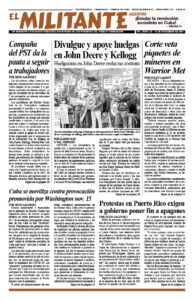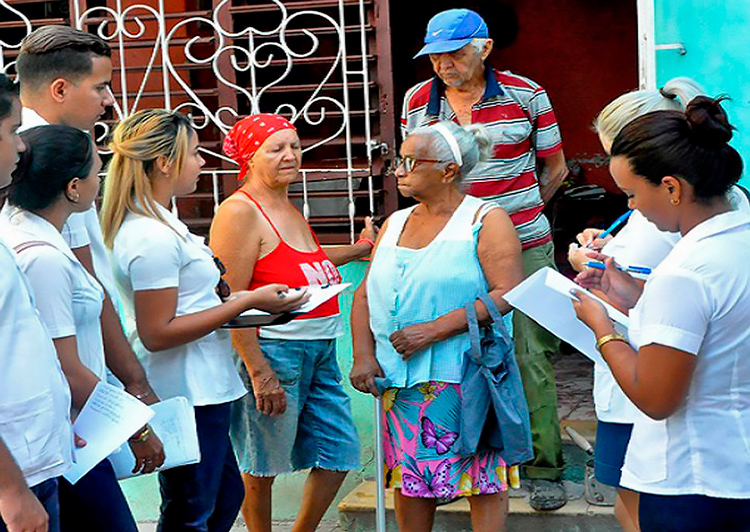There is no COVID-19 vaccine mandate in Cuba. Yet by the time you read this some 73% of the population will be fully vaccinated and over 90% will have at least one dose, one of the highest rates in the world.
Leaders of the socialist revolution there act on the capacities of working people to join together and mobilize to advance our interests. That approach is well captured in the words of Thomas Sankara, the communist leader of the 1983-87 popular revolution in Burkina Faso, West Africa. A real revolution, Sankara said, is based on “a convinced people, not a conquered people.”
In the United States, the most powerful capitalist country in the world, the fully vaccinated rate is less than 60%. Millions refuse to get vaccinated, despite the threat of being fired.
What’s at the heart of this stark contrast? In the U.S. many people don’t trust the government and the owners of the for-profit health industry, and with good reason.
In Cuba working people see the government as their own and trust it to tell them the truth about what needs to be done. That’s a result of a revolution that overthrew a brutal dictatorship in 1959 and brought the working class to power. With communist leadership, working people overturned capitalist property and set out to transform their conditions and themselves.
When COVID-19 spread in Cuba, the government mobilized working people to confront the challenge. No one was left on their own.
Mass organizations, including the neighborhood-based Committees for the Defense of the Revolution, the Federation of Cuban Women, student groups and unions, organized to carry out millions of visits, every day for months, to make sure people knew what precautions to take and that everyone who needed medical care got it.
Daily reports on the disease’s spread and measures taken made sure everyone was informed. Cuban Minister of Health José Angel Portal Miranada told the National Assembly of People’s Power in October that it was necessary to respond “in every neighborhood.” Constant communication, he said, “allowed us to listen better, share ideas and to know what were people’s main questions.”
At the same time, Cuban medical researchers got down to work and developed not one, but five vaccines.
“We wanted to rely solely on our own capacities to vaccinate our population,” Vicente Vérez Bencomo, a Cuban scientist who helped develop the Soberana vaccine, told Nature magazine in April. “And life is proving us right. What we’re seeing across the world is that vaccine supplies are being hoarded by the rich countries.”
The U.S. government gave millions of dollars to owners of pharmaceutical companies to develop vaccines that they used to reap vast profits. Pfizer bosses now project 2021 revenues to top $36 billion.
In Cuba, where health care is free and universal, people face the brutal consequences of the U.S. rulers’ decision to step up their embargo of the country. Companies “that have been selling us materials for 60 years,” got scared, Vérez said, after the administration of former President Donald Trump imposed 243 new sanctions — all of them continued by President Joseph Biden. Many companies stopped trading with Cuba.
Research institutes in Cuba have all “taken the resources we had for other projects and put them into this,” Vérez said. “Our scientists are used to doing a lot with very little.” After producing enough vaccine for the entire island, Cuba is sharing it with other countries and helping others produce it.
Biden treats workers as ‘deplorable’
Unlike in Cuba, the U.S. rulers consider working people “deplorable” and dangerous, blaming them for the disease’s spread. It treats them as recalcitrant objects to be bullied and regulated.
“Our patience is wearing thin,” Biden lectured in September as he announced vaccine mandates for firms with over 100 employees. “And your refusal has cost all of us,” he said, trying to divert attention from disregard for the lives of working people by the government and health companies that led to the unnecessary deaths of tens of thousands.
This is nothing new. In the late 1950s and early ’60s some 20,000 pregnant women in the U.S. were prescribed thalidomide to treat morning sickness. Richardson-Merrell, the company marketing the drug here, told doctors in 1961 there was no proof of harm, despite reports from Europe that mothers taking it bore children with no arms or legs. The drug wasn’t banned until mid-1962.
Between 1932 and 1972 the Tuskegee Institute in Alabama conducted a “study” on some 400 Black men with syphilis, deliberately withholding treatment long after penicillin became known as a cure.
As of Nov. 1, in New York City alone, the government has placed some 9,000 sanitation, firefighting and other workers on unpaid leave for not getting vaccinated. As a result, garbage is piling up and some fire companies say they can’t provide service.
“Working people should get fully vaccinated, but our class’s interests are threatened by government mandates that undercut rights,” Sara Lobman, Socialist Workers Party candidate for Manhattan Borough president, told the Militant Nov. 1. “We have no reason to give bosses and their government more tools for prying into our lives or more power to fire us.
“Instead, we urge unions to open their facilities and lead the fight to make sure everyone has access to vaccines and decent medical care,” Lobman said, “and to convince workers to get vaccinated so we can join together on the job to build the fighting union movement we need.”
“The actions of the Cuban government show what working people can accomplish when we establish a government of our own,” Lobman said. “That’s what we need to do here.”


